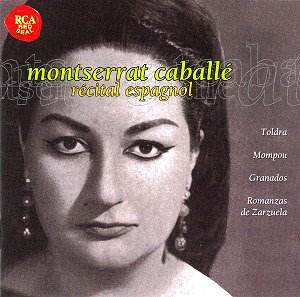After the less than enticing album devoted
to duets with Bernabé Marti and
Giuseppe di Stefano (Montserrat
Caballé: En Duo),
Caballé is alone again for the
final instalment (in my listening order)
of this series of four 2-CD packs which
bring into wider circulation the early
recordings she made in Spain in 1963-4
for the Vergara label, plus a few Columbias,
also made in Spain a decade later. I
gave an enthusiastic welcome to the
other two solo albums: Grandes héroïnes
lyriques (dedicated to opera) and
En récital (dedicated
to artsong).
As I listened to the
beautiful melodies of Eduardo Toldra
with their warmly colourful orchestral
settings I couldnít help wondering why
Canteloubeís Songs of the Auvergne have
travelled round the world and these
have not. Maybe it is another story
if you donít have Caballé to
sing them for in this, her first professional
studio recording, her voice is caught
in all the miraculous freshness of its
first flowering, perfectly produced
without a scratch on the surface. As
well as making a divinely beautiful
sound, she can be heard shading her
tone and caressing her words, which
brings me to the principal drawback.
While the music and performances can
be recommended to all who enjoy the
Songs of the Auvergne, the CD as it
stands can only be recommended to those
who are happy to lap such things up
without having the faintest idea what
they are actually about (or who understand
Spanish) since no texts, translations
or synopses are provided.
This is a greater drawback
still in the Mompou songs. Not, maybe,
in the first where the composerís gently
lulling accompaniment, warmly recorded,
and the beauty of the voice carry the
day, but in many of the songs austerity
is the order of the day, the idea presumably
being that the song is basically a vehicle
for the words. An Internet search produced
texts of eight of the fifteen songs,
with an English translation of just
one. A great pity, since the performances
have obvious documentary value and Mompou
was clearly a fine pianist. He produces
a consistently warm, well-rounded sound
from his instrument, and in the few
cases where technical dexterity is called
for he is well up to it. I hope I shall
have the opportunity to study these
performances, text in hand, in due course.
Texts and translations
of the Granados are easier to find,
of course. We are not told who the orchestrations
are by, but I frankly doubt that they
are by Granados himself since they seem
to be the work of someone who knows
his mid-period Stravinsky and have a
Thirties feeling with their sepia tints
and prominent guitar writing. Itís all
rather engaging and inventive, but when
I go to the piano version and hear it
played magically by Alicia de Larrocha
I know where my heart lies. The trouble
is, in order to hear the piano part
magically played by Alicia de Larrocha
I have to put up with the squally, vibrato-ridden
singing which is the best Pilar Lorengar
could manage at that late stage in her
career, and my heart cannot lie otherwise
than with Caballéís steady stream
of perfectly emitted sound. If she ever
returned to these pieces on disc with
a good pianist to partner her, that
would surely be the ideal solution,
especially if such a disc gave her a
less abrasively upfront recording Ė
there is also distortion on the high
notes here. Perfect singing of this
music then, but rather a lot of imperfect
things come with it.
More perfect singing
in the Zarzuela extracts, where Caballé
brings out the full power of her operatic
voice, and very effectively too. The
trouble is that, as with the Zarzuela
duets on the companion album En Duo,
weíre not allowed to have the slightest
idea what itís all about so it does
become a disc for vocal fanciers rather
than those wanting to know more about
the Zarzuela. A pity, for the arias
themselves are attractive and can surely
never have been sung better than here,
though again I was surprised at how
little Spanish they sound, excepting
the piece from "El nin judio"
Ė a matter of rhythm, not just the persistent
use of castanets in the orchestra.
Connoisseurs of great
singing will need this album and they
will know how to deal with the odd drawbacks.
Other had better consider first how
far the absence of texts and translations
in little-known music is going to worry
them. In a period when the major companies
lament declining sales, it would be
interesting to know how many sales they
are losing by this policy.
Christopher Howell
MONTSERRAT
CABALLÉ: Grandes héroïnes
lyriques
Montserrat
CABALLÉ en récital: Recital
"Los Encores"
Montserrat
CABALLÉ EN DUO - Duos de Amor
Montserrat
CABALLÉ: Récital espagnol



